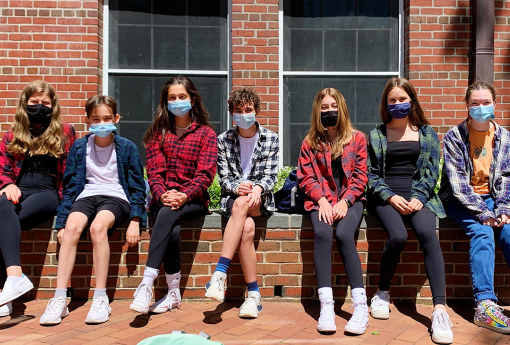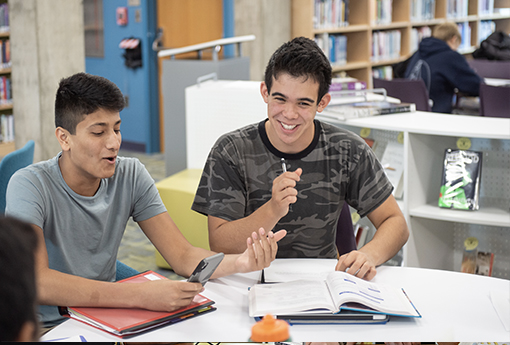
From the Upper School: Making Choices
January 22, 2020
For those of you who have read my opening of school letters over the years, you will know I have sometimes touched on the idea of choice. How much choice to cede to the adolescents in our lives is a question with which we all wrestle.
You all have been grappling with the question of child-driven choice since your kids were little. We see those Nursery students — some of them may have been yours once — who arrive at school clearly in charge of their own wardrobe decisions; we see others who may have had a little more parental guidance. You have had to decide when to allow your child to quit piano lessons, or walk to Thayer Street alone, or color their hair blue. For some of you, it’s only just now becoming clear that you really can’t make all the choices on behalf of your children; for others of you, that has been clear since their birth. We, too, grapple with student choice. Our graduation requirements are a good reflection of choices that we as a school have made. Not all schools require a year of visual and performing arts; not all schools require unity and diversity, or environmental science. For us, those requirements, and many, many others, reflect the choices we have made, and the values that we hold about teaching and learning, about student health and wellness.
What does any given school year look like for your children? What choices do they make? Well, we know they will do a lot of things. They play on teams, act in plays, take notes, complete labs. They will memorize poems, create podcasts, speak new languages, read novels, play instruments, write papers, and solve equations. They will compute, they will calculate, they will question.

They know, and so do we, that some of what they do is required, by us, by you, by society, but I hope that they also appreciate that a lot of what defines a school year, a lot of the learning that occurs, will be a result of the choices they make. We require that they take English this year; they will choose how to respond to their teachers’ comments, they will choose whether to start their paper the night — or the week — before it’s due. They won’t choose whether they take US history, but they will choose topics to research, questions to answer. They won’t choose whether to take a lab science, but they may start to identify whether their heart lies with Chemistry or Physics or Biology.
This? Or That?
They will choose whether to pursue leadership opportunities or not, whether to take specific courses, embark on an Aerie enrichment experience or join a team. They will choose whether they spend homework time wrestling with an idea or bailing and watching something on Netflix. They will choose how deeply to invest in classes, how best to get help when they need it. They will make choices about how to respond when things don’t go their way, when an assessment goes poorly, or when they struggle with a concept no matter how hard they try to master it.
They also choose how to treat other people. They decide which clubs they want to join, which activities are worth their time. Sometimes they’ll choose to say yes to an opportunity, and sometimes they’ll choose to say no. These choices will be complicated by a sense of their own strengths and weaknesses; their desire to please you; their desire to please their teachers and advisors. Their choices will be complicated by hormones and by frontal lobes that aren’t fully developed. Their choices are complicated by their growing need for independence and by the belief that there’s always a right answer or that mistakes (or bad grades) are fatal.
Sometimes you agree with their choices; sometimes you won’t. There are, of course, no guarantees that they’ll make great choices every single time; in fact, it would be extremely unusual if they did — but, with thought and reflection, with support from you and from us, they will learn something from each and every choice they make.
You make choices, too. You choose when to push and when to pull back when to offer advice or sit back and listen. What is the first question you ask when they come home? How did you do on that test? Or what did you learn today? How will you respond when your child is disappointed or gets a bad grade? What will your definition of a successful year be? Straight A’s? Or the learning that comes with the ups and downs that are inevitable.
Support at Home and School
As your kids/our students continue through high school and beyond, there will be even more choices. Right now, we are able to support as they make choices — the great ones and the bad ones — but that won’t always be true. Once they leave our worlds, they will have to navigate their own decision making. They’ll have to make their own choices about how to use their time, how to treat each other, how to negotiate the various challenges that life will most certainly throw their way. They will choose what issues are important to them, what type of work is most meaningful.
How are they going to make those choices? I hope that by reminding them that when it’s time to make a choice, it is important to know why they are making them and that while it is okay to want things, we also remind them of the relevance of the choices they make. No matter how it feels to them, school — and life, for that matter — aren’t just happening to them. It is my great hope that students see themselves as partners in this educational journey.
After all, at their best, choices should be authentic, and the “why” of school should come from curiosity, interest, and the internal joy found in learning rather than from external dictates or by what will happen after high school.
By Neeltje Henneman,
Head of Wheeler Upper School

